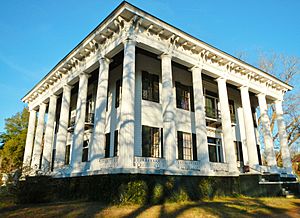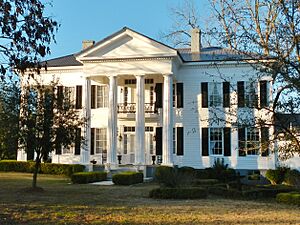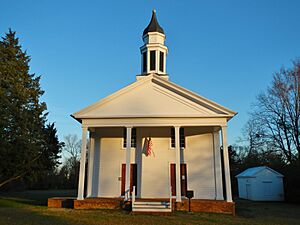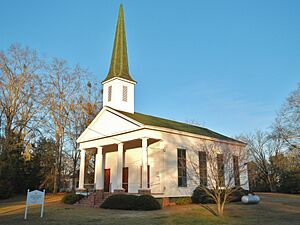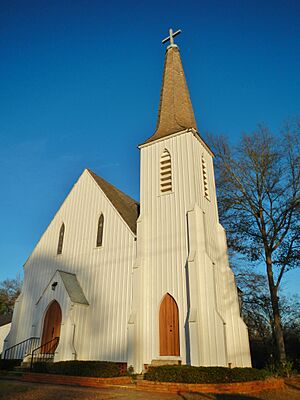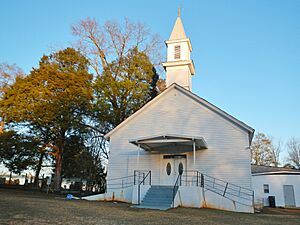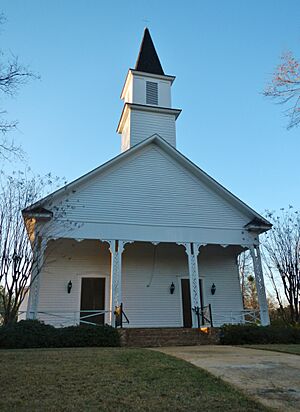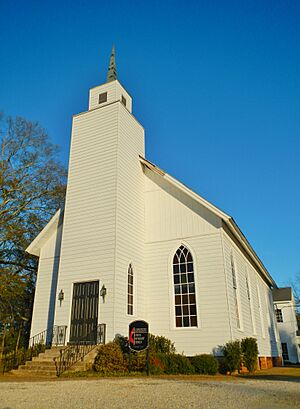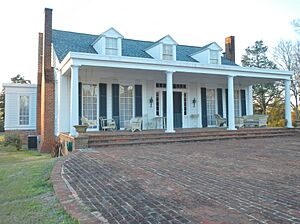Lowndesboro Historic District facts for kids
Quick facts for kids |
|
|
Lowndesboro
|
|
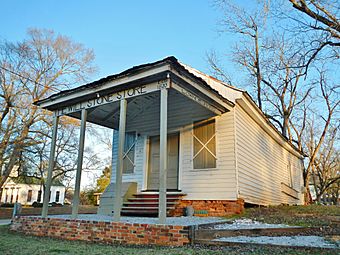
The Will Stone Store, (Est. 1820), one of the contributing properties in the district
|
|
| Location | N of U.S. 80, Lowndesboro, Alabama |
|---|---|
| Area | 1,800 acres (730 ha) |
| Architectural style | Greek Revival, Gothic Revival, Victorian |
| NRHP reference No. | 73000356 |
| Added to NRHP | December 12, 1973 |
The Lowndesboro Historic District is a special area in Lowndesboro, Alabama, United States. It's like a protected neighborhood filled with old and important buildings. This district was added to the National Register of Historic Places on December 12, 1973.
The National Register of Historic Places is a list of places across the country that are important to history. Being on this list helps protect these places. The Lowndesboro district covers about 1,800 acres, which is like 1,360 football fields! It includes the entire town of Lowndesboro.
Inside this district, there are 20 "contributing properties." These are buildings or sites that help make the district special and show its history. One famous building is Meadowlawn Plantation. You can see different building styles here, like Gothic Revival, Greek Revival, and other Victorian designs.
Contents
Exploring Lowndesboro's Historic Buildings
The Lowndesboro Historic District is home to many interesting old buildings. Each one tells a part of the town's story. These buildings show how people lived and built things long ago.
Important Homes and Plantations
Many of the historic buildings in Lowndesboro are old homes. These houses often have unique architectural styles. They give us a peek into the past.
Meadowlawn Plantation: A Historic Home
Meadowlawn is a beautiful old home built in 1853. It's one of the most important buildings in the district. Meadowlawn was also added to the National Register of Historic Places on December 12, 1973.
The Pillars: A Grand Greek Revival Home
The Pillars is a large plantation home built in 1857. It shows off the Greek Revival style, which was popular back then. Archibald Tyson, a cotton planter from North Carolina, had this impressive house built.
Other Notable Homes in the District
- Pecan Place: This antebellum home dates back to 1825. "Antebellum" means "before the war," referring to the American Civil War.
- Holly House: The main part of the Holly House was built in 1836.
- Little Cottage: This charming small house dates back to the 1830s.
- Rosewood: Built in 1855, Rosewood has been restored and looks great today.
- Dixon H. Lewis House: This house was built in 1835.
Historic Churches of Lowndesboro
Lowndesboro has several old churches that are part of its historic district. These buildings show the community's history of faith.
C.M.E. Church: A Very Old Church
The C.M.E. Church in Lowndesboro was built in 1833. It's one of the oldest buildings in the district. Today, the church is a public building and no longer holds regular services. It even has a special cupola from Alabama's original state capitol at Old Cahawba.
Presbyterian and Episcopal Churches
The Lowndesboro Presbyterian Church was built in 1856. St. Paul's Episcopal Church in Lowndesboro was built just a year later, in 1857. Both are beautiful examples of historic church architecture.
Baptist and Methodist Churches
The Lowndesboro First Missionary Baptist Church was built in 1880. The Lowndesboro Baptist Church and the Lowndesboro United Methodist Church were both built in 1888. These churches show the growth of the community over time.
Other Interesting Buildings
The district also includes other unique structures that have played a role in Lowndesboro's history.
The Marengo House: A Traveling Home
The Marengo House has a very interesting story! It was first built in Autauga County in 1847. Then, it was taken apart, moved across the Alabama River, and put back together in Lowndesboro in 1854. Since March 1, 2011, the Lowndesboro Town Hall has been located on the ground floor of Marengo.
Images for kids




